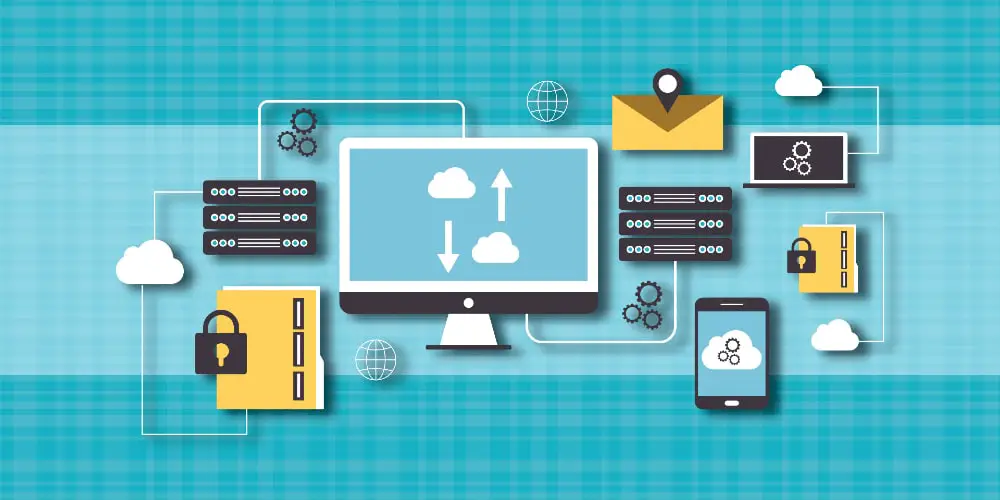The cornerstone of any successful business is structure, security, and organization, so it’s important to have a handle on all your documents, especially organizing client records.
Keeping track of client records can be bothersome or difficult, but ultimately it’ll help you become more efficient and effective. In today’s world of data breaches and cyber crimes, you can never be too cautious.
How you back up, secure, and organize the files of your clients can take time and be costly. However, you are ultimately responsible to make sure they are handled properly and secured. Our goal in this featured post is to help you sort out your options and find affordable solutions.
Here are 10 tips for making sure you keep your client records organized, secured, and backed up.
10 Tips On Organizing Client Records

1. Hardcopy & Electronic File Backup
Decide whether you want to keep hardcopy files, electronic files, or both. Your decision should take into account how much room you have available.
While electronic backup takes up very little space, client files need to be backed up often in case of computer failure or data corruption. You can back up to Backblaze B2 or simply search for another cloud storage provider to help improve data security and ensure its accessibility.
Regarding the backup and organizing files via hardcopy, these files take up much more room and can require additional resources to keep them safe. However, having both digital and hard copies of client records is going to be the ultimate option.
2. Use Password Protection & Dedicated Computer
If you’ll be keeping your filing system on a computer, use the password protection that your operating system offers, especially if the files contain any kind of personal information.
If possible, keep a separate computer or laptop for business purposes. Small, inexpensive laptops without a lot of bells and whistles are great as dedicated backups for small business files and other records.
3. Use Good Quality Secure Storage For Hardcopy
Will you need a secure area for files containing confidential information? Personal and sensitive information may need a locked cabinet or safe to protect it from prying eyes.
Investing in excellent quality locking storage could be good for your business in the long run. If you intend to keep hardcopy files, buy a filing cabinet. While cardboard boxes or stacks of folders on your desk are an easy solution, they aren’t feasible for the long term.
A small, locking, two or three-drawer filing cabinet is inexpensive and appropriate for any business just starting out.
4. Use A Master Index
A master index is a convenient way to locate files, especially when you have a large number of clients. Entries in your master index (which can be a computer file or a simple card file or Rolodex) should contain non-confidential information to identify the client, such as name, address, phone number, and e-mail address.
5. Try Using A Code System
Labeling file folders and entries in your master index with corresponding identification codes can also be useful. For example, you could use the client’s name and the date of your first job with them in an alpha-numeric combination.
For example, if John Smith hired you for the first time on March 22, 2023, your code for his file might be JSM-32223. Your own personally-created codes will have a quick interpretation for you when you need to go right to a file.
6. Utilizing Notes Can Be Helpful
Make notes on your files. Making personal notes about clients will help you to remember individuals and their needs more quickly, rather than skimming through many pages of an entire file for the small piece of information you’re looking for.
7. Try An Online Tool
Online tools can be handy for filing, and with many programs now available, information is backed up for you automatically. If you choose an online tool, be sure and vet it first and look at reviews.
Ask around about security, confidentiality, and reliability in your circle of business. If you have doubts or find too many bad reviews, steer clear and look for a highly-rated filing tool.
It is also worth remembering that online files are not as secure as those in your personal computer or filing cabinet.
8. Take Time To Organize
Take time to work on your files. Unless you have everything on a computer or online, your filing system is not going to automatically organize itself. Don’t let paperwork build up on your desk.
While ‘organized chaos’ is amusing in theory, walking in on a desk covered in stacks of paper does not inspire confidence in a customer. Don’t put off filing until you’re drowning in paperwork. Just a few minutes at the end of each day or a half hour once a week is sufficient to get files squared away.
9. Destroy Old Documents
Be sure to shred old and defunct files; never toss them into the trash whole. Stealing unshredded paperwork that contains personal information is one of the top methods for identity theft. Invest in a shredder.
Small, personal shredders that destroy discs and heavier materials as well as paper are convenient, inexpensive, and constantly useful. Some office supply stores offer a shredding service to dispose of your sensitive documents.
10. Get Someone To Help
If you feel that you can’t handle your filing, it might be worth your sanity to hire someone to do it for you.
Businesses that are just getting up and running don’t have a lot of petty cash, but you don’t need someone on the payroll full-time. Ask a friend or family member who has experience with filing to give you some help for a little extra money.
Tips On Organizing Client Records – Summary
In summary, taking a proactive approach to backing up and organizing your client’s records is going to be one of the most important security measures you can implement for your business.
It’s a serious concern in a world of hackers with an evil intent to destroy you and your client. Do what it takes to stay on top of organizing and securing client records and you will be ready in case the unthinkable happens.
Being organized, lowering liability, and reducing risk is always satisfying for business owners!

This is my first year as a digital marketer, and most of what I do is website design. It seems like the previous commenters are highly suggesting encryption of files, but also keeping physical files to cover both sides. Obviously, the online files are the easiest to access, but being organized is the best suggestion I saw on the list. 🙂 Just be organized, and keep hoping for more website design business, but be prepared to keep track of the clients if they do some to me.
Whether you file electronically, use a filing cabinet or even a shoe box make sure you set sometime each week to file everything away.
I was at a clients office last week who is complaining that their work is getting on top of them and low-and-behold he had 7,000 emails in his Inbox, 4,000 unread going all the way back to 2003!
No wonder he’s struggling to cope.
I’m glad I’m not his book keeper!
Thats great article, I recommend guys to do this when their business is in growing level, if you are not doing it now then you will difficult to this with lot of files. Keep a period for files and delete it.Its better to give a copy to your client if possible. Thanks for wonderful tips.
Excellent tips, just wanted to comment on #1, Electronic filing is the way to go, best way to stay green and save space.. Also allows you to have access to records with a click of a button vs. having to dig through papers in file cabinets.
Awesome list. I have sort of a system. I’ve been freelancing for a year now, so its still in the works but its like Organized Chaos….lol.
Its funny…I’m a complete neat freak on my computer….but anywhere else…not so much.
My system is fairly simple right now…. All my emails are forward to my gmail account. I have 3 main folders.. Current Clients, Old Clients, and Estimates. I move the emails around according to the status of the account.
For large clients that seem to generate a LOT of emails I create them there own folders.
I also have a folder for receipts..so I keep all emails of payments received and invoices sent (I invoice via PayPal)
on My computer I have a ‘Work’ folder inside each client gets there own folder. At the end of the year I take all clients folder and put them in a folder of the current year… (i.e all work done in 2010, is put in a 2010 folder)
I use Last Past for all my passwords and form data. I also use Dropbox for sharing of files between clients. I also have found Google Docs to be very useful instead of downloading all word docs and such to my computer.
Thats my organization system for now…it still needs fine tuning (the emails for sure) but it works for me.
“Use Password Protection And A Dedicated Computer”
If someone gets their hands on the computer, it would be no problem whatsoever to get the files. I won’t mention how here, but I could do it in 15 minutes or less.
Encrypt the files.